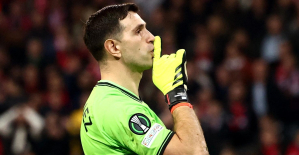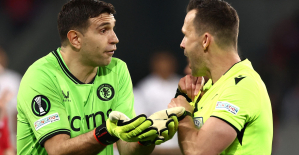There is no blessing on this Berlin repeat election. On Monday, state returning officer Stephan Bröchler was relieved to announce that this time everything went well. On Tuesday it became known that 466 postal votes in the Lichtenberg district had not been handed over by the post office in good time and were therefore not counted.
That should now be made up for, the votes would then be included in the official final result, said Bröchler. For the SPD and the Greens, the trembling should continue as to which party is in second place behind the election winner, the CDU. According to the provisional official result, the SPD had won the race with just 105 votes.
But the recent breakdown is not the only problem. The modalities of repeat elections are causing chaos, especially in the districts. Here, the election result leads to the curious situation that there have been significant changes in the majority in the district parliaments - almost exclusively in favor of the victorious CDU.
Nevertheless, the previous district mayors and city councilors remain formally in office. The reason: They are elected officials for the duration of their five-year term of office. According to the district administration law, their term of office only ends prematurely if they die, resign or are voted out by a two-thirds majority. However, withdrawal is associated with the loss of all pension entitlements.
"This is an unsatisfactory legal situation that is not adapted to the situation that can arise after a repeat election. Because unlike a new election, the legislative period does not end, but simply continues,” says Christian Pestalozza, Professor of Administrative Law at the Free University of Berlin. A complete repeat election was simply not considered by the legislature.
In order to really make a fresh start, politicians should have agreed on a dissolution of parliament and an early election when the decision of the state constitutional court to declare the 2021 election invalid became foreseeable. "That would have been a clear cut, because the problems that would follow from a repeat election could have been clearly foreseen," said Pestalozza WELT. "But they didn't have the strength to kill themselves."
Now parties and Berliners have to live with the consequences. And they are highly unsatisfactory, especially for the victorious CDU. In many districts it has clearly overtaken the previously leading parties.
Example Spandau: The CDU achieved a lead of 15,000 votes over the SPD. "From this I derive the clear claim to become district mayor," says top candidate Frank Bewig. But the incumbent district mayor Carola Brückner (SPD) would have to agree to withdraw.
He will now seek talks with all parties apart from the AfD in order to discuss the implementation of this voter's will, says Bewig. "I'm not out for a fight, I want to solve it together, also with the incumbent district mayor. I'm sure that in the end all political forces in Spandau will accept the result."
In Neukölln, youth councilor Falko Liecke, a CDU man, is also laying claim to the SPD-led town hall. “If you stand up for democracy, it is essential to recognize the will of the voters and not leave everything as it is out of your own claim to power,” argues Liecke. "If the voters are massively disappointed, this can also have consequences for future elections."
Technically, a solution could look like agreeing with the other parties on a formal deselection of the mayor and city councilors by a two-thirds majority. In a next step, the new election can then take place.
But whether the losers in the election are willing to participate in their own voting for reasons of fairness has not yet been decided. “I have taken on the responsibility of leading the Charlottenburg-Wilmersdorf district. I have been appointed to do this. I take on this responsibility. Everything else is in the hands of the parliamentary groups in the district assembly,” says Kirstin Bauch, Green district mayor of Charlottenburg-Wilmersdorf. Here, the Union has clearly passed the previously leading Greens and is claiming additional posts for itself.
The incumbent Neukölln District Mayor Martin Hikel (SPD) says that a simple “business as usual” cannot exist. However, he is counting on the fact that there is a uniform procedure in the district offices across Berlin. "Otherwise, chaos and confusion will only increase." On Wednesday, the mayors and city councils of the SPD will meet to discuss a joint approach.
One person who is willing to give up his position as Deputy Mayor is Kevin Hönicke (SPD) from Lichtenberg. Even before the election, he had argued that the new majorities should also be reflected in the district office - "even if it ends badly for me". This case has now occurred. "I could keep my city council post, but I wouldn't be deputy mayor anymore. Nevertheless, I firmly believe that the will of the voters must be implemented.”
There is agreement with the CDU that the current district office must be deselected. “But the SPD has not got that far in the other districts. Many cling to their posts.” Constitutional lawyer Pestalozza therefore believes that the issue of district governments will ultimately be resolved in the style of horse-trading. "Perhaps the CDU will not challenge the SPD's claim to leadership at state level. Or the SPD will be compensated with posts in a grand coalition. My imagination can't be strong enough."
"Kick-off Politics" is WELT's daily news podcast. The most important topic, analyzed by WELT editors, and the dates of the day. Subscribe to the podcast on Spotify, Apple Podcasts, Amazon Music, among others, or directly via RSS feed.

 Sydney: Assyrian bishop stabbed, conservative TikToker outspoken on Islam
Sydney: Assyrian bishop stabbed, conservative TikToker outspoken on Islam Torrential rains in Dubai: “The event is so intense that we cannot find analogues in our databases”
Torrential rains in Dubai: “The event is so intense that we cannot find analogues in our databases” Rishi Sunak wants a tobacco-free UK
Rishi Sunak wants a tobacco-free UK In Africa, the number of millionaires will boom over the next ten years
In Africa, the number of millionaires will boom over the next ten years WHO concerned about spread of H5N1 avian flu to new species, including humans
WHO concerned about spread of H5N1 avian flu to new species, including humans New generation mosquito nets prove much more effective against malaria
New generation mosquito nets prove much more effective against malaria Covid-19: everything you need to know about the new vaccination campaign which is starting
Covid-19: everything you need to know about the new vaccination campaign which is starting The best laptops of the moment boast artificial intelligence
The best laptops of the moment boast artificial intelligence Bitcoin halving: what will the planned reduction in emissions from the queen of cryptos change?
Bitcoin halving: what will the planned reduction in emissions from the queen of cryptos change? The Flink home shopping delivery platform will be liquidated in France
The Flink home shopping delivery platform will be liquidated in France Bercy threatens to veto the sale of Biogaran (Servier) to an Indian industrialist
Bercy threatens to veto the sale of Biogaran (Servier) to an Indian industrialist Switch or signaling breakdown, operating incident or catenaries... Do you speak the language of RATP and SNCF?
Switch or signaling breakdown, operating incident or catenaries... Do you speak the language of RATP and SNCF? The main facade of the old Copenhagen Stock Exchange collapsed, two days after the fire started
The main facade of the old Copenhagen Stock Exchange collapsed, two days after the fire started Alain Delon decorated by Ukraine for his support in the conflict against Russia
Alain Delon decorated by Ukraine for his support in the conflict against Russia Who’s Who launches the first edition of its literary prize
Who’s Who launches the first edition of its literary prize Sylvain Amic appointed to the Musée d’Orsay to replace Christophe Leribault
Sylvain Amic appointed to the Musée d’Orsay to replace Christophe Leribault Skoda Kodiaq 2024: a 'beast' plug-in hybrid SUV
Skoda Kodiaq 2024: a 'beast' plug-in hybrid SUV Tesla launches a new Model Y with 600 km of autonomy at a "more accessible price"
Tesla launches a new Model Y with 600 km of autonomy at a "more accessible price" The 10 best-selling cars in March 2024 in Spain: sales fall due to Easter
The 10 best-selling cars in March 2024 in Spain: sales fall due to Easter A private jet company buys more than 100 flying cars
A private jet company buys more than 100 flying cars This is how housing prices have changed in Spain in the last decade
This is how housing prices have changed in Spain in the last decade The home mortgage firm drops 10% in January and interest soars to 3.46%
The home mortgage firm drops 10% in January and interest soars to 3.46% The jewel of the Rocío de Nagüeles urbanization: a dream villa in Marbella
The jewel of the Rocío de Nagüeles urbanization: a dream villa in Marbella Rental prices grow by 7.3% in February: where does it go up and where does it go down?
Rental prices grow by 7.3% in February: where does it go up and where does it go down? With the promise of a “real burst of authority”, Gabriel Attal provokes the ire of the opposition
With the promise of a “real burst of authority”, Gabriel Attal provokes the ire of the opposition Europeans: the schedule of debates to follow between now and June 9
Europeans: the schedule of debates to follow between now and June 9 Europeans: “In France, there is a left and there is a right,” assures Bellamy
Europeans: “In France, there is a left and there is a right,” assures Bellamy During the night of the economy, the right points out the budgetary flaws of the macronie
During the night of the economy, the right points out the budgetary flaws of the macronie These French cities that will boycott the World Cup in Qatar
These French cities that will boycott the World Cup in Qatar Europa Conference League: the semi-final flies to Lille, which loses to the wire against Aston Villa
Europa Conference League: the semi-final flies to Lille, which loses to the wire against Aston Villa Lille-Aston Villa: Cash disgusts Lille, the arbitration too... The tops and the flops
Lille-Aston Villa: Cash disgusts Lille, the arbitration too... The tops and the flops Handball: Les Bleues in the same group as Spain at Euro 2024
Handball: Les Bleues in the same group as Spain at Euro 2024 Europa Conference League: for Létang, Martinez “does not have the attitude of a high-level athlete”
Europa Conference League: for Létang, Martinez “does not have the attitude of a high-level athlete”


















